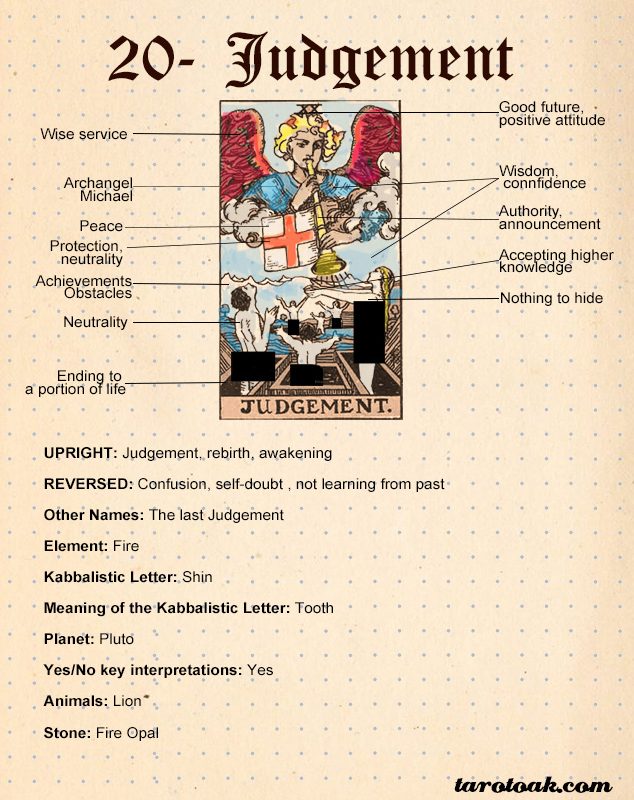The Judgement card in the Tarot deck stands as a formidable symbol of transformation, enlightenment, and rebirth, inviting both introspection and moral reckoning. Often depicted as an angelic figure blowing a trumpet, summoning the dead from their graves, this card reverberates with profound metaphors of resurrection and accountability. Each element within the imagery is steeped in meaning, laying a rich tapestry that speaks to the transitions one faces in life.
At its core, the Judgement card beckons an awakening. It signifies a moment of reckoning, where the past collides with the present in a transformative awakening. This can evoke feelings akin to a phoenix rising from its ashes, signifying not just survival, but a rebirth—an emergence from former constraints toward a more enlightened state of being. The trials and tribulations endured become stepping stones for personal growth and revelation.
Understanding the nuances of the Judgement card requires delving into its symbology. When flipping this card in a reading, one may notice the imagery of a luminous angel, often resembling Gabriel, with wings outstretched, floating above a tumultuous landscape. Engraved beneath the angel’s feet are the figures emerging from their graves—symbolic of the dead awakening to the call of higher truth. This element alludes to the concept of accountability and the weight of past actions coming to light, igniting questions about self-worth and ethical decisions.
Moreover, the card resonates with the theme of evaluation. Much like a scholar assessing his own work, the Judgement card urges one to take a reflective pause. It is a call for self-assessment, urging individuals to look inward and consider the tapestry of their decisions. In doing so, one may unearth a wealth of insights revealing the lessons learned through struggle and triumph alike.
Intriguingly, the Judgement card also embodies the dichotomy of conclusion and new beginnings. The old and familiar may be shed to make space for something remarkably new. It serves as a reminder that conclusions are not merely endings, but often harbingers of new beginnings, just as the end of a day heralds the arrival of night, subsequently giving way to a new dawn. This cyclical flow of existence underscores that life itself is an endless series of chapters—where each ending is but a prelude to another opportunity for growth.
When encountered in a tarot reading, the card may also symbolize a collective awakening. This signifies the harmonizing of individual journeys into a larger narrative, compelling the querent to consider their role within the context of their community or the greater populace. This communal awakening can affect social justice movements, shifts in consciousness, or simply one’s understanding of how they connect with others. Herein lies a potent reminder that each individual’s choices resonate beyond personal spheres, shaping collective destinies.
On a more personal level, the Judgement card prompts an exploration of one’s inner calling. It serves as a nudge toward realizing one’s potential and purpose, fueling aspirations to follow a path that aligns with one’s true self. Just as a seed knows to strive toward the sun, the Judgement card beckons individuals to pursue their authentic desires, despite the fears that may whisper otherwise.
Yet, with great power comes profound responsibility, and the Judgement card also emphasizes accountability. Decisions made in life echo long after they are rendered. This aspect of the card highlights the importance of recognizing past choices and their consequent impact, pushing individuals to seek redemption or forgiveness where needed. It acts as a mirror, reflecting both virtue and vice; thus, the process of reflection nurtures an understanding of one’s moral compass.
This process can often feel daunting. In a world rife with complexities, the Judgement card challenges individuals to confront their inner demons while simultaneously embracing their personal truths. The act of self-understanding can be both liberating and terrifying, but in navigating this labyrinth of self-discovery, one may ultimately emerge as a more integrated individual. This card fosters the realization that while the past cannot be altered, one’s response to it can dramatically shape the future.
As one considers the potential implications of the Judgement card, it simultaneously invites an exploration of spiritual awakening. The angelic figure signifies a connection to higher powers or the divine, illuminating pathways toward transcendence. This card urges individuals to tune into their intuition, to trust in the unseen forces guiding their journeys. Spiritual journeys often require courage, and the Judgement card empowers those willing to take leaps into the unknown—to trust in their inner wisdom as a beacon of light.
In summation, the Judgement card is a cogent reminder of the intricate dance between reflection, responsibility, and rebirth. It evokes feelings of empowerment while addressing the complexities of existence. Whether it signifies personal growth, communal shifts, or spiritual awakening, this card imbues its bearer with a sense of purpose—a clarion call to awaken to one’s own life narrative, fostering the courage to embrace both the past and the future. Therein lies the unique allure of the Judgement card; it not only serves as a potent symbol of individual experience but also as a universal reminder of the continuous evolution of the human spirit.







Leave a Comment